October 29, 2011
Science, what's it up to?
| The Daily Show With Jon Stewart | Mon - Thurs 11p / 10c | |||
| Weathering Fights - Science: What's It Up To? | ||||
| ||||
Oh, Aasif Mandvi. Well done.
"Pretty soon, you're hooked on that grant money, looking for the next big score... Is that what you want?"
posted October 29, 2011 08:59 AM in Humor | permalink | Comments (0)
April 30, 2011
Masters Exams
An all too familiar experience.
Tip to Cris Moore.
posted April 30, 2011 08:45 AM in Humor | permalink | Comments (0)
April 06, 2011
Yes, exactly.
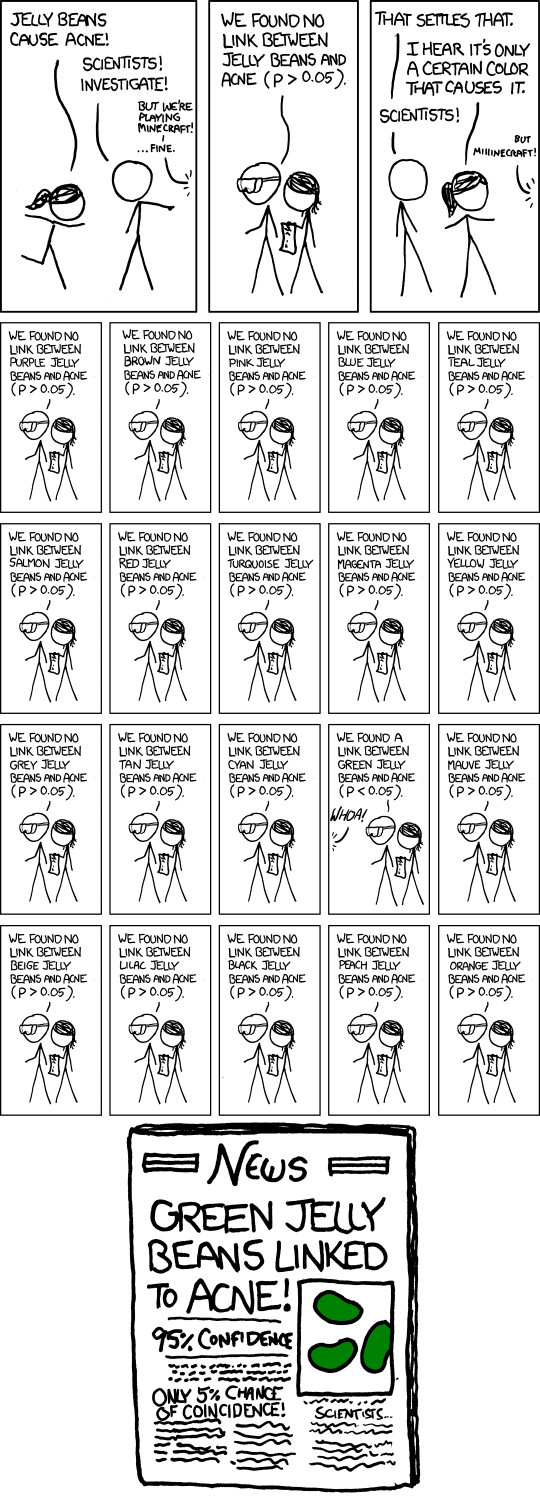
And another:
Tip to Rob Knight for the last one.
posted April 6, 2011 08:56 AM in Humor | permalink | Comments (1)
March 25, 2011
Why scientists are different
xkcd on why scientists are different from non-scientists.

posted March 25, 2011 10:01 AM in Humor | permalink | Comments (1)
March 18, 2011
Space and Time
Parts one and two of the BBC Red Nose Day 2011 Dr. Who special. Well worth the 8 minutes. Plus, you get a humorous lesson in space-time loops, and a Tardis joke.
posted March 18, 2011 11:22 PM in Humor | permalink | Comments (0)
October 15, 2010
How to start a social movement
What does it take to start a social movement? This is the basic question underlying a huge amount of current research in computational social science, done mainly by computer scientists, who are trying to understand the dynamics of influence and how influence, whatever it is, shapes information flows through social networks. The computer scientists care about this question, I think, because they've read Malcolm Gladwell, or they've been told that's its important by advertising executives who have read him, and they want to know how to create viral marketing. (I guess they haven't read Duncan Watts.)
Digging through the data is hard, but conceptually, social movements are not so complicated that they can't be understood. Derek Sivers explains in this wonderfully amusing short (the beginning of the voiceover transcript is pasted below) why more than mere leadership is required to make a social movement:
[Sivers] If you've learned a lot about leadership and making a movement, then let's watch a movement happen, start to finish, in under 3 minutes, and dissect some lessons:
A leader needs the guts to stand alone and look ridiculous. But what he's doing is so simple, it's almost instructional. This is key. You must be easy to follow!
Now comes the first follower with a crucial role: he publicly shows everyone how to follow. Notice the leader embraces him as an equal, so it's not about the leader anymore - it's about them, plural. Notice he's calling to his friends to join in. It takes guts to be a first follower! You stand out and brave ridicule, yourself. Being a first follower is an under-appreciated form of leadership. The first follower transforms a lone nut into a leader. If the leader is the flint, the first follower is the spark that makes the fire...
Tip to Nikolaus.
posted October 15, 2010 03:26 PM in Humor | permalink | Comments (2)
September 15, 2010
Physicists

I both went to a liberal arts college and majored in physics, so I really hope I don't come across like this guy. I do know some people (physicists, even) who definitely do...
(Monday's xkcd comic is also pretty damn good.)
Update 16 Sept. 2010: Here's another great xkcd comic, on physics and other fields.
posted September 15, 2010 06:40 AM in Humor | permalink | Comments (2)
August 13, 2010
Universe closed

For those less familiar with the locale, Universe and Rainbow are two streets in Albuquerque NM. This kind of thing makes you wonder if the traffic person who had the sign made, or the people who set it up, noticed the double meaning.
Tip to Lisa, via Barbara, via Duke City Fix via Kaid Benfield via ...
posted August 13, 2010 07:44 PM in Humor | permalink | Comments (1)
July 21, 2010
Learning to say "no"
I'm not sure I learned this when I was in graduate school, but I'm definitely having to learn it now...
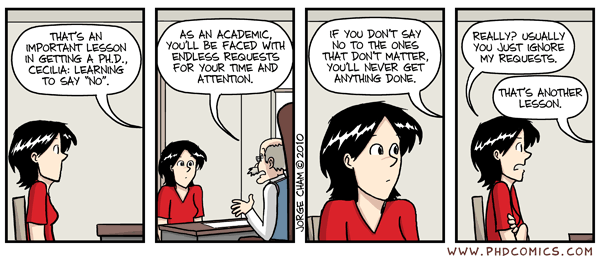
posted July 21, 2010 07:31 AM in Humor | permalink | Comments (2)
July 13, 2010
Oliver's Travels - Switzerland (3 December 2009)
An oldie, but goodie.
| The Daily Show With Jon Stewart | Mon - Thurs 11p / 10c | |||
| Oliver's Travels - Switzerland | ||||
| ||||
Tip to Jon Wilkins
posted July 13, 2010 09:48 PM in Humor | permalink | Comments (0)
April 12, 2010
As a real doctor...
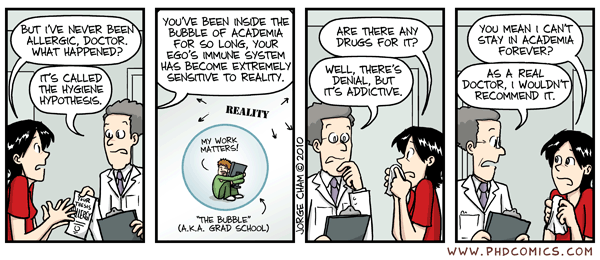
posted April 12, 2010 10:28 AM in Humor | permalink | Comments (0)
January 07, 2010
This household item is, on average, 2.7 years old.
Yesterday on one of the morning radio shows that Lisa and I listen to on the way to work, this puzzle was posed: What household item is, on average, 2.7 years old? [1]
I thought it might be some kind of semi-durable good, like a TV. But, I was wrong. The answer was salad dressing. Yuck! [2]
Oh, and happy new year! Since my first entry of 2010 is about nutrition (kind of), let me end on a positive note by recommending Michael Pollan's new bite-sized book "Food Rules: An Eater's Manual", which he recently promoted on The Daily Show:
| The Daily Show With Jon Stewart | Mon - Thurs 11p / 10c | |||
| Michael Pollan | ||||
| ||||
-----
[1] Apparently, this question was asked on a lot of radio shows around the same time (here, here, and here), so it probably has a common source...
[2] It's not clear to me that this isn't some kind of urban legend (or even just a made up fact), but it does seem superficially plausible... If we take it at face value, a corollary would be that many people have 5 year old salad dressing in their fridge, and some salad dressing is even older (which would be necessary to balance the the probably more numerous bottles that are less than 2.7 years old; some people, after all, actually use salad dressing regularly). An alternative explanation, though, would be that the salad dressing you buy at the grocery store is already pretty old when you buy it.
posted January 7, 2010 09:19 AM in Humor | permalink | Comments (3)
October 24, 2009
Irony, tinged with truth
During the G-20 protests in Pittsburgh held September 22-25, CMU machine learning students took to the streets to support their causes. "Support vector machines!" and "Ban genetic algorithms!", they demanded. "Bayesians against discrimination!", they cried. And my favorite of all:

Luckily, the news media, in the form of the indomitable John Oliver, were there to cover and support the efforts. (And thus these savvy protesters made it on the Oct. 1 Daily Show for about 3 seconds at the 9m11s mark; blink and you'll miss them.)

Tip to Jake Hofman and Arthur Gretton (whose photos these are).
posted October 24, 2009 09:53 AM in Humor | permalink | Comments (1)
July 03, 2009
But it makes so much sense
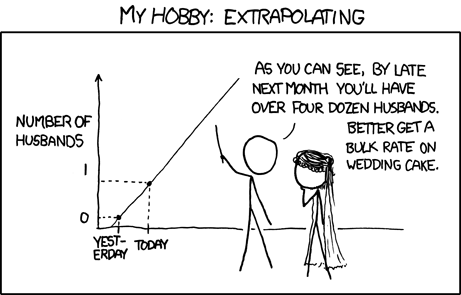
This is a little extreme, but to be honest, scientists also love to extrapolate, and some of what they say is not much better than this...
(thanks xkcd)
posted July 3, 2009 09:35 AM in Humor | permalink | Comments (6)
May 02, 2009
John Oliver vs. The LHC
Oh my.
| The Daily Show With Jon Stewart | M - Th 11p / 10c | |||
| Large Hadron Collider | ||||
| ||||
posted May 2, 2009 05:52 PM in Humor | permalink | Comments (1)
March 20, 2009
Holy hand grenade
You couldn't make this stuff up. Here's slashdot's summary, which says it best:
Bomb disposal teams were called in and a nearby pub evacuated after water company engineers mistook a Monty Python film prop for a hand grenade. After nearly an hour of examination by bomb experts, they counted to three. No more. No less. Three was the number they counted, and the number they counted was three. Four they did not count, nor two, except to proceed to three. Five was right out. Once the number three had been reached, being the third number, they declared that the grenade was actually a copy of the "Holy Hand Grenade of Antioch" used in the film Monty Python And The Holy Grail. A police spokeswoman confirmed that the device was a toy and that it had been no danger to the public.
(tip to /.)
posted March 20, 2009 07:16 PM in Humor | permalink | Comments (1)
March 06, 2009
Oh so clever

(thanks xkcd)
posted March 6, 2009 10:36 AM in Humor | permalink | Comments (1)
February 04, 2009
Statistical significance

(thanks xkcd)
posted February 4, 2009 07:53 AM in Humor | permalink | Comments (1)
January 16, 2009
Abstract Madlibs
Jorge Cham's latest PhD Comic sounds like so many abstracts I've read, and probably like many that I've written!
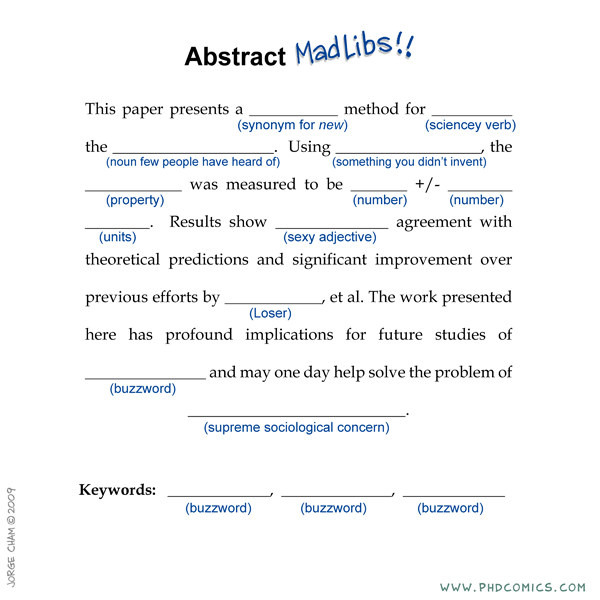
posted January 16, 2009 08:43 AM in Humor | permalink | Comments (3)
September 11, 2008
We're still here
Despite some mildly ridiculous fears that science (in the form of the Large Hadron Collider at [1] CERN in Gevena Switzerland) would cause the world would end yesterday we're still here. Whew. It must have been God's Will. To celebrate, here's a mildly ridiculous rap song about the LHC experiment (which, quite pleasantly, gets the physics right).
(Tip to Tanya for the video.)
Update 12 September 2008: The New York Times has run a well written piece by Brian Greene on the LHC and it's significance.
-----
[1] For more information about what CERN is, check out this 3 minute video on YouTube about it.
posted September 11, 2008 02:05 PM in Humor | permalink | Comments (1)
August 26, 2008
Cows are magnets.
Hot off the press at the Proceedings of the National Academy of Science is an article about magnetoreception in cows and deer [1]. Begall and colleagues, perhaps having spent far too much time playing with Google Earth, noticed that grazing cows and deer [2] seem to slightly prefer aligning themselves N-S, like magnets in the Earth's magnetic field. From the abstract
To test the hypothesis that cattle orient their body axes along the field lines of the Earth's magnetic field, we analyzed the body orientation of cattle from localities with high magnetic declination. Here, magnetic north was a better predictor than geographic north. [3]
Time to rewrite the physics textbooks, I guess: Cows are spheres, yes, but magnetic spheres!
-----
[1] S. Begall, J. Cerveny, J. Neef, O. Vojtech and H. Burda, "Magnetic alignment in grazing and resting cattle and deer." PNAS 105, 13451-13455 (2008).
[2] I was very disappointed, when I read through the article itself, to find no satellite pictures of cows aligned N-S. Indeed, there was not a single picture of a cow (or deer)!
[3] This is a good control to test the possibility that the E-W orientation of the sun drove the animals to prefer N-S in order to maximize the absorbed solar radiation. So, it seems that there really is some kind of weak magnetoreception going on. Now it's a matter of figuring out what biological compounds convey this magnetic sensitivity, and how its response to the Earth's field percolates up to behavioral tendencies.
posted August 26, 2008 10:59 AM in Things that go squish | permalink | Comments (3)
July 27, 2008
Dancing
Where the Hell is Matt? (2008) from Matthew Harding on Vimeo.
It's hard to top the explanation that NASA's Astro Photo of the Day page gave to this video, so I'll just quote it here:
What are these humans doing? Dancing. Many humans on Earth exhibit periods of happiness, and one method of displaying happiness is dancing. Happiness and dancing transcend political boundaries and occur in practically every human society. Above, Matt Harding traveled through many nations on Earth, started dancing, and filmed the result. The video is perhaps a dramatic example that humans from all over planet Earth feel a common bond as part of a single species. Happiness is frequently contagious -- few people are able to watch the above video without smiling.
posted July 27, 2008 03:54 PM in Humor | permalink | Comments (1)
September 24, 2007
New Math
This wasn't how I learned how to do basic arithmetic, but it sure is entertaining when sung like this.
(tip to David)
posted September 24, 2007 07:19 PM in Humor | permalink | Comments (0)
August 28, 2007
ANOVA
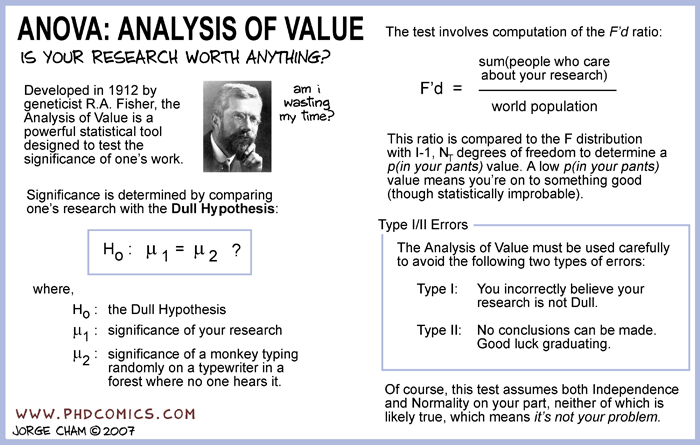
(via PhD Comics)
posted August 28, 2007 10:23 AM in Humor | permalink | Comments (0)
April 15, 2007
A rose is a rose
Warning: Because I'm still recovering from my catastrophic loss last Monday, blogging will be light or ridiculous for a little while longer. So, without further ado...
A few weeks ago, I inadvertently initiated a competition in the comment thread of Scott Aaronson's blog on how to identify physicists. It all started with Scott claiming that he was not a mathematician (as New Scientist claimed he was in an article about D-wave's press releases about quantum computers). As various peoples weighed in on Scott's mathematicianness, finally Dave Bacon proposed a sure fire way to settle the question:
Place yourself and a large potted plant in a huge room together. If you get tangled up in the plant, you are a mathematician. I draw this test from careful observation of the MSRI in Berkeley.
I then wondered aloud how to identify physicists, and I was returned a laundry list of characteristic behaviors:
- Hearing the word “engineering” causes a skin rash. [John Sidles]
- Writes “a”, says “b”, means “c”, but it should be “d” [Polya]
- Frequently begins sentences with “As a physicist…” (as in “As a physicist, I care about the real world, not the logical consequences of the assumption I just made”) [Scott Aaronson]
- When told he is actually a mathematician he thinks: “LOL” and all the mathematician go: “OMFG”. [Peter Sheldrick]
- They think that, since walking forwards gets them from their house to work, walking backwards in the opposite direction must have the same outcome. (Re: the replica method) [James]
- Is interested in creating just one job. [John Sidles]
- Considers chemists to be underqualified physicists, and biologists to be overqualified philatelists. [anonymous]
Amusingly, I know many people (physicists, mostly) who are walking, talking caricature of these. I also know some excellent people in physics departments who certainly are not, and I'm not sure what they do is "physics". I wonder if they think of themselves as physicists...
I know I promised to keep this ridiculous, but I can hardly help myself. So, if you'll permit me a lengthy navel-gazing digression, there's an interesting question here, which has to do with the labels communities of people choose to adopt, and how they view interlopers. For instance, I have no idea whether to call myself an applied mathematician (maybe not), a physicist (almost certainly not, although most of my publications are in physics journals), a computer scientist (still not quite right even though my doctorate is in CS), or what. Informatician sounds like a career in oratory, no one knows what an "applied computer scientist" is, and none of Complex systemsatist, "compleximagician," or statico-phyico-algorithmo-informa-complexicist have that nifty ring to them. (And, for that matter, neither does plecticist.)
With my recent phase change, when people ask what I do, I've taken to simply saying that I'm a "scientist." But, that just encourages them to ask the obvious follow up: What kind of scientist? In some sense, applied mathematician seems colloquially, kind of, maybe, almost like what I do. But, I'm not sure I could teach in a mathematics department, nor would other applied mathematicians call me one of their own. Obviously, these labels are all artificial, but they do matter for hiring, publishing, and general academic success. The complex systems community hasn't achieved a critical-enough mass to assert its own labels for the people who seem to do that kind of work, so, in the meantime, how should we name the practitioners in this field?
Update, 16 April 2007: One colleague suggests "mathematical scientist" as an appropriate moniker, which I tend to also like. Sadly, I'm not sure other scientists would agree that this is a useful label, nor do I expect to see many Departments of Mathematical Science being created in the near future (and similarly for "computational scientist") ... End Update
posted April 15, 2007 08:30 PM in Humor | permalink | Comments (8)
March 30, 2007
The difference
Via xkcd: "How could you choose avoiding a little pain over understanding a magic lightning machine?" So true. So true...
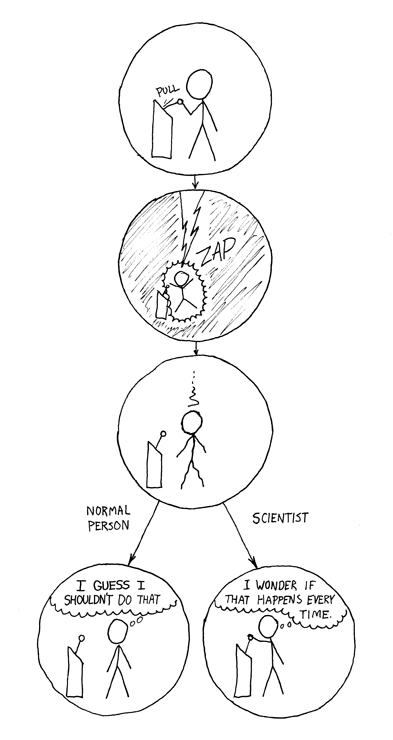
posted March 30, 2007 10:16 AM in Humor | permalink | Comments (3)
March 29, 2007
Nemesis or Archenemy
Via Julianne of Cosmic Variance, the rules of the game for choosing your archnemesis. The rules are so great, I reproduce them here, in full.
1. Your archnemesis cannot be your junior. Someone who is in a weaker position than you is not worthy of being your archnemesis. If you designate someone junior as your archnemesis, you’re abusing your power.
2. You cannot have more than one archnemesis. Most of us have had run-ins with scientific groups who range continuous war against all outsiders. They take a scorched earth policy to anyone who is not a member of their club. However, while these people are worthy candidates for being your archnemesis, they are not allowed to have that many archnemeses themselves. If you find that many, many people are your archnemeses, then you’re either (1) paranoid; (2) an asshole; or (3) in a subfield that is so poisonous that you should switch topics. If (1) or (2) is the case, tone it down and try to be a bit more gracious.
3. Your archnemesis has to be comparable to you in scientific ability. It is tempting to despise the one or two people in your field who seem to nab all the job offers, grants, and prizes. However, sometimes they do so because they are simply more effective scientists (i.e. more publications, more timely ideas, etc) or lucky (i.e. wound up discovering something unexpected but cool). If you choose one of these people as an archnemesis based on greater success alone, it comes off as sour grapes. Now, if they nabbed all the job offers, grants, and prizes because they stole people’s data, terrorized their juniors, and misrepresented their work, then they are ripe and juicy for picking as your archnemesis. They will make an even more satisfying archnemesis if their sins are not widely known, because you have the future hope of watching their fall from grace (not that this actually happens in most cases, but the possibility is delicious). Likewise, other scientists may be irritating because their work is consistently confusing and misguided. However, they too are not candidates for becoming your archnemesis. You need to take a benevolent view of their struggles, which are greater than your own. [Ed: Upon recovering my composure after reading this last line, I decided it is, indeed, extremely good advice.]
4. Archnemesisness is not necessarily reciprocal. Because of the rules of not picking fights with your juniors, you are not necessarily your archnemesis’s archnemesis. A senior person who has attempted to cut down a grad student or postdoc is worthy of being an archnemesis, but the junior people in that relationship are not worthy of being the archnemesis of the senior person. There’s also the issue that archnemeses are simply more evil than you, so while they’ll work hard to undermine you, you are sufficiently noble and good that you would not actively work to destroy them (though you would smirk if it were to happen).
Now, what does one do with an archnemesis? Nothing. The key to using your archnemesis effectively is to never, ever act as if they’re your archnemesis (except maybe over beers with a few close friends when you need to let off steam). You do not let yourself sink to their level, and take on petty fights. You do not waste time obsessing about them. Instead, you treat them with the same respect that you would any other colleague (though of course never letting them into a position where they could hurt you, like dealing with a cobra). You only should let your archnemesis serve as motivation to keep pursuing excellence (because nothing annoys a good archnemesis like other people’s success) and as a model of how not to act towards others. You’re allowed to take private pleasure in their struggles or downfall, but you must not ever gloat.
While I’m sure the above sounds so thrilling that you want to rush out and get yourself an archnemesis, if one has not been thrust upon you, count your blessings. May your good fortune continue throughout your career.
In the comment thread, bswift points to a 2004 Esquire magazine piece by Chuck Klosterman on the difference between your (arch)nemesis and your archenemy. Again, quoting liberally.
Now, I know that you’re probably asking yourself, How do I know the difference between my nemesis and my archenemy? Here is the short answer: You kind of like your nemesis, despite the fact that you despise him. If your nemesis invited you out for cocktails, you would accept the offer. If he died, you would attend his funeral and—privately—you might shed a tear over his passing. But you would never have drinks with your archenemy, unless you were attempting to spike his gin with hemlock. If you were to perish, your archenemy would dance on your grave, and then he’d burn down your house and molest your children. You hate your archenemy so much that you try to keep your hatred secret, because you don’t want your archenemy to have the satisfaction of being hated.
Naturally I wonder, Do I have an archnemesis, or an archenemy? Over the years, I've certainly had a few adversarial relationships, and many lively sparring matches, with people at least as junior as me, but they've never been driven by the same kind of deep-seated resentment, and general bad behavior, that these two categories seem to require. So, I count myself lucky that in the fictional story of my life, I've had only "benign" professional relationships - that is, the kind disqualified from nemesis status. However, on the (quantum mechanical) chance that my fictional life takes a dramatic turn, and a figure emerges to play the Mr. Burns to my Homer Simpson, the Newman to my Seinfeld, the Dr. Evil to my Austin Powers, I'll keep these rules (and that small dose of hemlock) handy.
Update, March 30, 2007: Over in the comment section, I posed the question of whether Feynman was Gell-Mann's archnemesis, as I suspected. Having recently read biographies of both men (here and here), it was hard to ignore the subtle (and not-so-subtle) digs that each man made at the other through these stories. A fellow commenter Elliot, who was at Caltech when Gell-Mann received his Nobel confirmed that Feynman was indeed Gell-Mann's archnemesis, not for scientific reasons, but for social ones. Looking back over the rules of the game, Feynman does indeed satisfy all the criteria. Cute.
posted March 29, 2007 12:04 AM in Simply Academic | permalink | Comments (0)
March 09, 2007
Art or fake?
M.V. Simkin, Scientific inquiry in modern art, E-print, (2007).
I report the results of the test, where the takers had to tell true masterpieces of abstract art from the fakes, produced by myself. Every picture can be described by the fraction of the test takers, who selected it as a masterpiece. When judged by this metric, the pictures show no stratification between masterpieces and fakes, suggesting that they are of about the same quality.
Simkin's website reverent.org hosts the quiz itself, which you can take. I scored a dismal 75% accuracy (better than chance, and slightly better than the average score of Ivy Leaguers and Oxbridge participants (71%), but shameful considering how much time I've spent in art museums over the years). His site has several other quizzes, too, and my self-esteem is mildly assuaged by the fact that, at least, I can distinguish human art from non-human crap (bird poop vs. Jackson Pollock: 100%, human vs. ape: 100%). I didn't dare to try to distinguish machine translation from Faukner.
posted March 9, 2007 10:54 AM in Humor | permalink | Comments (1)
February 16, 2007
Greatest fear
A scientist's greatest fear...

Courtesy of xkcd.
posted February 16, 2007 11:43 AM in Humor | permalink | Comments (0)
January 19, 2007
Ken Robinson on education and creativity
I started running across the TED talks a while back, and thought the whole conference seemed like a wonderful idea. I'd completely forgotten about them until I was perusing the PresentationZen blog (which is chock full of useful tips on making presentations better - something I think about regularly since part of my life is spent standing in front of audiences blathering on about things I hope they find interesting), which linked to this one by Sir Ken Robinson on creativity and education. It's quite funny, but also makes some excellent points. (The link goes to a TED page with the same video file.)
Another I quite enjoyed was by Hans Rosling's talk on global health. He's quite a champion of both collecting and visualizing data, and his animations of how the nations of the world have changed (fertility, income, child mortality, etc.) over the past 40 years are truly impressive.
posted January 19, 2007 10:36 PM in Humor | permalink | Comments (0)
September 06, 2006
When politics gets you down...

This is one of twelve "finalists" of a competition for political cartoons about science being run by the Union of Concerned Scientists. Personally, I've always liked Fafblog!'s take on the issue.
posted September 6, 2006 08:35 PM in Humor | permalink | Comments (0)
August 30, 2006
The truth, but funny
Some of us have it worse than others, but when I laughed at this, it hurt a little, too.
posted August 30, 2006 12:26 AM in Humor | permalink | Comments (3)
July 29, 2006
Look around you, maths & germs
These are completely ridiculous. My favorite bits were the synthesizer background music, which reminded me of the video games I played on our Atari growing up, the mathematical graffiti and the Lepidopterus arboratus.
posted July 29, 2006 08:52 PM in Humor | permalink | Comments (0)
June 25, 2006
An Inconvenient Truth
Tip to onegoodmove.
posted June 25, 2006 02:28 PM in Global Warming | permalink | Comments (0)
June 05, 2006
Backyard science
What happens when you put a Mentos(tm) into a Diet Coke(tm)? A violent release of energy on the part of the diet coke releasing a large amount of CO2. Here's what happens when you have a lot of free time on your hands, a lot of diet coke and a lot of mentos. Seems to me that this would make a great high school chemistry demo.
posted June 5, 2006 09:23 PM in Humor | permalink | Comments (0)
February 06, 2006
A perfect monster
This is so on the mark that it's a bit scary. (Tip to Terry.)
posted February 6, 2006 12:25 AM in Humor | permalink | Comments (0)
January 13, 2006
On Wit and Pith in Reviewing
While exploring some pages over at ScienceBlogs, I came across a discussion of two current titles about the modern relationship between politics and science, The Republican War on Science, by Chris Mooney and Politically Incorrect Guide to Science by Tom Bethell, and what one can learn about these texts from their reviewer comments at Amazon.com. Interesting in and of itself, but that's not the point of this entry.
Rather, consider this wonderful book listing, and more importantly, its reviewer comments.
posted January 13, 2006 12:30 PM in Humor | permalink | Comments (1)
November 13, 2005
Graduate students are cool.
The sign of a good teacher is being able to convey the importance of their subject in a manner that engages their audience, making them walk away knowing (not just believing) that they've learned something valuable and novel, and wondering what other interesting things may lay down the path just revealed to them. I like to call this the "Wow"-factor, and it's what gets people engaged in a subject, whether they are just beginning their intellectual journey or have worn through several pairs of shoes already (although, probably for different reasons and in different ways).
The Value of Control Groups in Causal Inference (and Breakfast Cereal) by Gary King of The Social Science Statistics Blog, which I may have to add to my regular list now. King describes a great way to teach a fundamentally important piece of knowledge - the importance of a null-model (or a control group).
A few years ago, I taught the following lesson in my daughter's kindergarden class and my graduate methods class in the same week. It worked pretty well in both. Anyone who has a kid in kindergarten, some good graduate students, or both, might want to try this. It was especially fun for the instructor.
To start, I hold up some nails and ask "does everyone likes to eat nails?" The kindergarten kids scream, "Nooooooo." The graduate students say "No," trying to look cool. I say I'm going to convince them otherwise.
King also recommends Teaching Statistics: A Bag of Tricks for those of us interested in more compelling demos to dislodge our students from their cynicism.
posted November 13, 2005 04:29 AM in Humor | permalink | Comments (0)
October 05, 2005
That "haha" kind of funny
I am not a regular reader of The Onion. Years ago, it seemed as if every one of my friends was. With mostly different friends now, I don't receive pointers to nearly as many stories, and my life is, I'm sure as a result, much less full. Thank goodness someone (still) reads The Onion, so that I (still) don't have to. Two amusements for you:
Halliburton Given Contract To Rebuild Cheney
This reminds me of a certain movie.
Intelligent Design Trial
I have only vaguely been following the trial in Dover, PA, mostly on account of its mere existence being supremely depressing. Given that, I still applaud the parents who have brought suit against the school board. In addition, however, let me recommend The Loom, which routinely demonstrates (in an award-winning way) the kind of clear and precise writing that we on the side of logic and rationality need more of.
posted October 5, 2005 02:30 AM in Humor | permalink | Comments (0)
May 05, 2005
The joys of unfettered research
Although I diligently try to keep up with the new papers in my field, there are just so many to read... yet, some are more pleasant than others. In fact, some could be said to be downright pleasurable, such as a mathematical model of scientists writing papers (and citing other papers). Or an empirical study of the frequency of natural numbers on the World Wide Web. Who says science is humorless?
Update: In following the power-law exuberance, power laws exist in the income distribution of movies in the United States. This doesn't suprise me one bit actually, since there is pretty strong evidence that humans prefer a power law in the popularity of things (e.g., power-law degree distribution in the sales of books, etc.). Somehow, I doubt that power laws of this kind will not continue to make headlines...
Friend Dennis Chao (of psdoom fame; another shining example of the fruits of unfettered research) pointed me to this amusing bit of research in 2003 by a pair of Canadian psychologists on the effects of a pretty female face on heterosexual men's ability to accurately estimate the future value of goods. From the article:
A sex difference in discounting is predictable. Because men have always had some chance of gaining fitness from short-term expenditures of mating effort, whereas successful reproduction typically requires more prolonged parental investment by women, men should have evolved to discount the future more steeply than women, and sex differences in age-specific mortality confirm this expectation (e.g. Arias 2002). Men also have higher discount rates than women in choices of monetary rewards (Kirby & Marakovic 1996).
and, on their results,
As predicted, discounting increased signif icantly in men who viewed attractive women, but not in men who viewed unattractive women or women who viewed men; viewing cars produced a different pattern of results.
Straight men's weaknesses: cars and pretty girls...
posted May 5, 2005 04:23 AM in Scientifically Speaking | permalink | Comments (0)